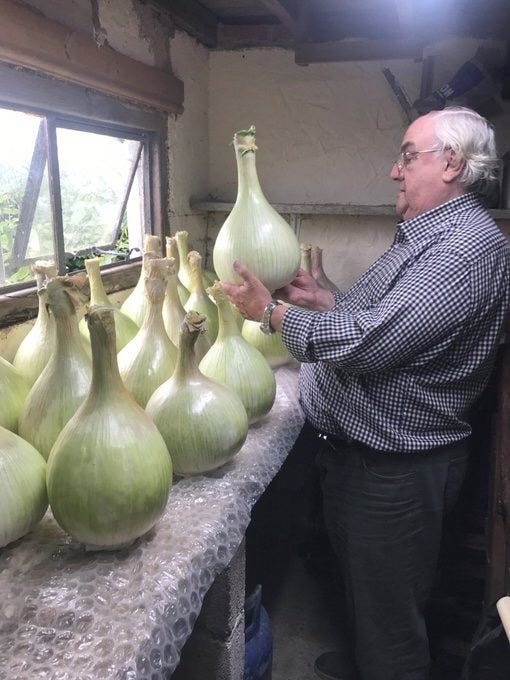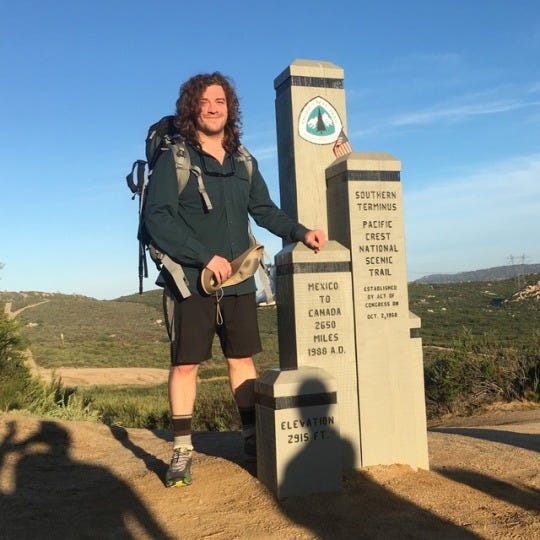Tabs Open #4: For What Are We Born

Welcome to Tabs Open!
This week: the death penalty, a Welsh gardening champion, dinosaur extinction, and more. Thanks for coming along for the ride.
1. Can I interest you in a little background music while you read? Here’s Merle Haggard, live at Austin City Limits in 1978. Pair it with this newsletter like you would a fine wine.
2. Being a somewhat morbid person, I spend a lot of time contemplating not only my own inevitable death but those of loved ones, friends, and the unmet billions that comprise the rest of the world. I say this not to position myself as some arbiter of the profound but to try to illustrate for you how often I am philosophically hamstrung by what appears to be the near-certainty of our planetary slide toward oblivion. In recent years this has taken the form of trying to reconsider one of my longest-held dreams: fatherhood. Who am I, I have wondered, to pull consciousness from the ether and bestow it on a new being, knowing, as I do, that the world is not getting any better, despite what Bill Gates might have you think?
Of late, though, I think I have started to tilt back toward the idea that it is not an immoral choice to bring life into the world, broken and bloody and burning as it is. I consider all the joy that new life can bring, joy that might otherwise be in short supply: my brother and his wife are expecting their first child in a few weeks, and at least a half-dozen other friends are at varying stages of pregnant right now, too. The knowledge that we’ll all be dead someday should be occasion for more celebration, not less. So I took some measure of comfort and strength from this recent piece in The Outline laying out the philosophical case not just for continuing to find joy and meaning in the face of what feels like an inevitable destruction, but for actively becoming part of the solution instead. Maybe you will too. Here’s a teaser (emphasis mine):
Perhaps if any sort of positive political program could be associated with this sort of professional intellectual hobbyism, it would be a closed, stoic acceptance that evil will happen anyway, so we may as well live our lives as best we can while coming to terms with it. But this not only seems foolishly fatalistic, it also seems callously individualistic — as individuals we might give up, and tend to the inside of our own heads, but what gives us the right not to fight for everyone else?
I especially dig that last line. It reminds me of something Hemingway wrote in For Whom the Bell Tolls, on the occasion of one character’s bafflement that someone he’s just met could be so selfless when they’re all probably going to die at the hands of fascist soldiers: “For what are we born if not to aid one another?”
(PS--Not to brag but what if it’s my kid that actually ends up saving the world? Pretty good reason to try to have one, imo.)
3. It is occasionally baffling to me that in the year 2019 we still have the death penalty in the United States. Whether that makes me a naïf is for you to decide, I guess. But the practice of capital punishment is so many things--callous, cruel, classist, racist, unjust, bloodthirsty, the list goes on--that it sometimes feels like enough to make me lose all faith in the world. (Especially in light of the larger existential concerns addressed above. Goddamn.)
In that spirit, a story that hit me hard this week was this profile of Project Hope to Abolish the Death Penalty, a group of death row inmates organizing for their own commutation. (Most don’t even claim their own innocence, although it is certain that there are innocents among them, just as it is certain that the United States has executed hundreds of innocent people over the years--lowball estimates put wrongful capital convictions at 4%, which would mean a minimum of 630 of the 15,746 government-sanctioned executions in US history took the life of an innocent person. But the absence of innocence remains the operative point: the barbarity of the death penalty should make it too severe a punishment for even society’s most hardened killers; that we average 2.6 wrongful executions a year just props up the point.)
But back to Project Hope, which seeks to provide just that, something I’m doing a lousy job of. They’re doing wildly inspiring work in Alabama, where hope in the prison system is a rare bird indeed. I hope you’ll read their story. For further reading, especially if you find yourself squishy on whether we should get rid of the death penalty entirely, allow me to recommend Bryan Stevenson’s Just Mercy. If you can make it through more than 20 pages a day you’re made of sterner stuff than I.
4. Okay, you’ve suffered enough for one newsletter. Here’s your chance to get some respite looking at one of my favorite Twitter accounts, that of Welsh gardener extraordinaire Medwyn Williams. What a joy--I hope he’s going to take grandson applications sometime soon. Gobeithio y byddwch yn byw am byth, Medwyn.

5. In one of my dozen or so regular group chats, a friend shared a passage from John Steinbeck last week that has really stuck with me in the way that only good writing, the kind that both affirms and sheds new light on your own worldview, can. I wanted to share that with you for reasons that will probably be clear as soon as you read it.

6. There’s a good chance you recently saw the New Yorker story about the day the dinosaurs died, a story hinging on one of the most groundbreaking scientific discoveries the field of paleontology has ever had. The details of the asteroid impact itself are so ludicrous as to be almost incomprehensible; seeing them anew reminded me of one of the most jaw-dropping things I’ve ever read--Peter Brannen’s description of the extinction event from his book The Ends of the World:
“The meteorite itself was so massive that it didn’t notice any atmosphere whatsoever,” said Rebolledo. “It was traveling 20 to 40 kilometers per second, 10 kilometers — probably 14 kilometers — wide, pushing the atmosphere and building such incredible pressure that the ocean in front of it just went away.”
These numbers are precise without usefully conveying the scale of the calamity. What they mean is that a rock larger than Mount Everest hit planet Earth traveling twenty times faster than a bullet. This is so fast that it would have traversed the distance from the cruising altitude of a 747 to the ground in 0.3 seconds...In its nearly instantaneous descent, it compressed the air below it so violently that it briefly became several times hotter than the surface of the sun.
“The pressure of the atmosphere in front of the asteroid started excavating the crater before it even got there,” Rebolledo said.
Unlike the typical Hollywood CGI depictions of asteroid impacts...in the Yucatan it would have been a pleasant day one second and the world was already over by the next. As the asteroid collided with the earth, in the sky above it where there should have been air, the rock had punched a hole of outer space vacuum in the atmosphere. As the heavens rushed in to close this hole, enormous volumes of earth were expelled into orbit and beyond — all within a second or two of impact.
“So there’s probably little bits of dinosaur bone up on the moon,” I asked.
“Yeah, probably.”
What the hell!
7. Last Friday I had the chance to go see writer & artist Austin Kleon speak. I owe Austin a lot; without having been a subscriber to his newsletter for the last few years, I would never have gotten the idea to do this one.
He covered a whole bunch of topics, but fittingly, given the theme of this newsletter issue, he spoke a lot about how to find it in you to keep making art in calamitous times. He also talked about the value of keeping your head down and letting the work be the work--refusing to let yourself count likes or retweets or page views. It’s good advice, so just know that if you haven’t read all the way to this point in the newsletter, I’m resolving not to let it get to me.
Thanks for following along this week! If you’re enjoying Tabs Open, feel free to tell your friends where to find the newsletter.
-Chuck
Bonus: Sunday marked 3 years since I set out on the Pacific Crest Trail. Here’s a post I wrote to commemorate the 1 year anniversary of finishing it. Look at this goober--he knows so little about what’s to come.


